An Open Letter to the Social Worker Who Wrote My Case Files
Earlier this year, Rebekah Pierre (Social worker and BASW PO) requested her care-files, and was shocked by what they contained. The below open letter is penned as a call to action, and to raise awareness about the importance of kind, caring and accurate case records, as part of National Care Leavers Week 2022.
Trigger Warning - contains extracts of case notes some may find upsetting, with reference to CSE & domestic abuse.
Dear Tara*,
Before I wrote this letter, I double checked the spelling of your name just to make sure it was correct. I know how jarring it can be when the basics are not quite right; you misspelt my name almost one hundred times in the case files you wrote about me whilst I was under your care. I received these last week, after submitting an SAR request to the relevant local authority.
Speaking of names, let me remind you of mine. My name is Rebekah. It is the Hebrew spelling, and I am quite fond of it. It may sound like a small detail to some, but to me, it matters. It is the name I was given when I was born.
Case Note 1
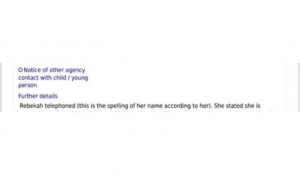
I once corrected the spelling, as you can see in Case Note 1. But it never was changed on the system. Instead, a rather blunt note was written to say ‘this is the spelling of her name according to her’ (for the record, I wasn’t lying). This was just one of many examples where I was not believed.
I don’t know if my name rings a bell - but even if it does, you probably wouldn’t recognise me now. You were involved in my life at a time I was extremely vulnerable and on the verge of being homeless - a 16-year-old girl with everything to live for, who didn’t have much interest in living at all.
Case Note 2
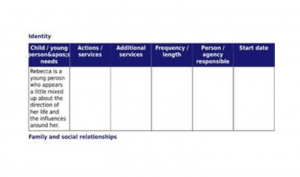
Since that time, much has changed; despite being a ‘young person who is a little mixed up about the direction of her life’ (your words - see case note 2), I ended up following in your footsteps. I wanted to be like the residential social worker I had after you, who practised with care, kindness and compassion. I have since had the privilege of practising alongside many such practitioners, who transform lives every day. On reflection, perhaps I wasn’t so ‘mixed up’ about the direction of my life after all?
During my career, I have read case notes of varying quality. Most have been child-centred and thorough. Others have not. But for all I have read, nothing could have prepared me for reading my own records - particularly the entries written by you.
To give you the benefit of the doubt, I imagine you have changed since writing these records. Your approach may well be unrecognisable now; it is why I took the time to write this letter. I have some small faith that this time, you will hear me. I hope in earnest that you will.
I cannot pretend my recording is perfect. I know how hard it is to write good case notes whilst balancing competing deadlines and crises. But I have always done my utmost to be respectful - to write with the child in mind.
In your defence, I don’t think I was the audience you had in mind when you wrote them, was I? Perhaps you saw the screen in front of you as the final destination. It was not; your words, written about but without me, would not remain hidden forever. One day, I would understand my rights.
Speaking of rights, do you remember taking me to an Achieving Best Evidence interview after school, where I had to disclose the most traumatic events of my life to yourself and a police officer? It was my right to have an advocate - something I only learned years later.
It took all the strength I had to get through those 4 hours, with no emotional support or break. I have never felt so small, so humiliated. Looking back, it was like an inquisition. Like somehow, I was the one on trial. Now it is my turn to ask the questions.
The first is this; how dare you?
Case Note 3
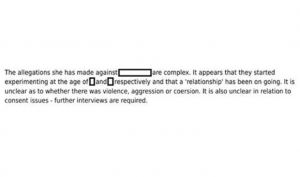
It took more courage than you will ever know to disclose that a child known to my extended family, who became an adult whilst I was still a minor, abused me throughout childhood. If you believed I was ‘experimenting’ or in a ‘relationship’ with the perpetrator as you suggest in case note 3, then your thinking isn’t only flawed, but dangerous. I was a child. I could not consent.
I refer you to the independent inquiry into CSE in Rotherham - something you would have known about, given this was then-ongoing. Its messages are clear: Do not blame victims. Show empathy. Believe them.
Which begs the question - where did you draw the conclusions that the allegations were ‘complex’ with ‘consent issues’? What observable evidence did you base this on?
Were you there when the perpetrator threatened me into silence, forbidding me to tell anyone? Did you feel the weight of this threat, a terrible yoke around my neck?
Were you there when I used to crawl under the bed to hide from them? Did you hear as I made my breathing imperceptible so I wouldn’t be found? When I played dead to survive?
Were you there in the room when it happened? Did you watch as my soul left my body, a pattern of dissociation which continued long after it stopped?
Were you there when my OCD spiralled out of control? When I couldn’t pay attention at school because, in my helplessness, I used to repeat the same 5 words incessantly in my mind for hours on end? Please-God-Make-This-Stop?
Were you there?
Case Note 4
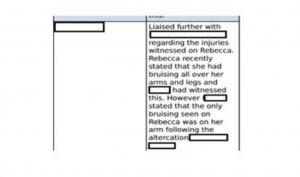
This was not the only time I was not believed. When disclosing domestic abuse, the marks still fresh on my body, you minimised this too.
Is an attack on a child at the hands of an adult ever an ‘altercation’ as you describe in case note 4, or is it abuse? And why were you so concerned that bruises were ‘only’ seen on my arms? Does the absence of one (and by the way, bruises fade) negate the other?
Case Note 5
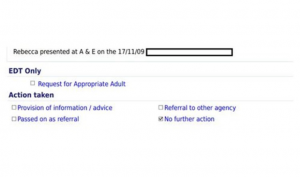
On a similar note, why, after I presented A&E dangerously unwell, was ‘no further action’ recommended, with no explanation? Do you know how it feels to read that such a traumatic event was met with a tick-box?
Case Note 6
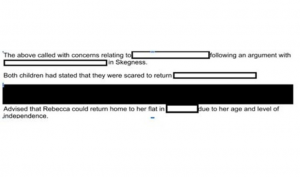
No further action seems to be the common response, as seen in case note 6. After I called you in distress 200 miles away from my unregulated placement, you advised I could return alone due to my ‘age and independence’. No follow up was ever given to see if I was okay.
Case Note 7
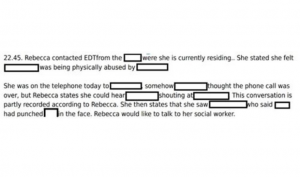
My records, just like your involvement with me, ends rather abruptly. The very last sentence in case note 7 stands unanswered across the passage of time. I never did hear from you again.
It is too late to go back in time. But it is not too late to make a meaningful change for other children. May your words be worthy of each of them. Who knows, one day, you may find yourself reading what they grow up to write about you.
Yours,
Rebekah (with a k)